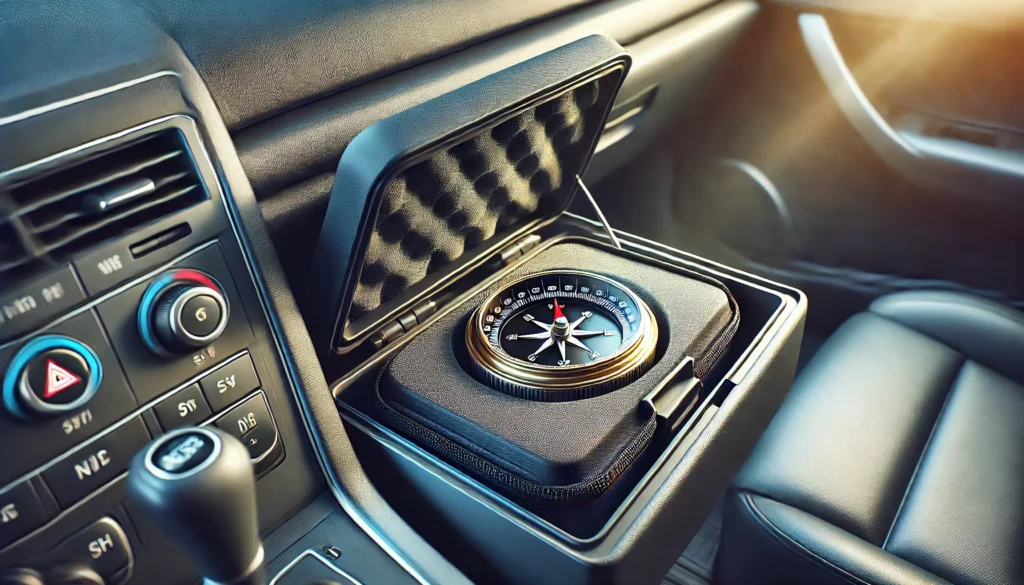Table of Contents
ToggleStoring a Compass in Your Vehicle: Safe or Risky?
Whether you’re an outdoor enthusiast or someone who likes to stay prepared for emergencies, a compass is an essential tool. But can you safely store it in your vehicle without compromising its accuracy and functionality? Let’s explore the answer in this definitive guide, complete with expert tips and actionable advice to ensure your compass stays reliable and long-lasting.
The Short Answer
Yes, you can store a compass in your vehicle, but you must take precautions to prevent magnetic interference, temperature damage, and physical wear. By following a few simple steps, you can ensure your compass remains functional and ready for use when you need it most.
Why Is Compass Storage in a Vehicle a Concern?
1. Magnetic Interference
Vehicles are filled with metal components and electronics like speakers, GPS devices, and dashboards with built-in magnets. These can distort the magnetic field, causing your compass to give inaccurate readings.
Pro Tip: Always store your compass away from electronics and metal parts of the car.
2. Extreme Temperature Exposure
Cars can become excessively hot in summer or freezing cold in winter. These temperature fluctuations can:
- Crack or leak liquid-filled compasses.
- Affect the internal magnetization of dry compasses.
Solution: Keep your compass in a temperature-controlled environment when possible.
3. Physical Damage from Vibration and Movement
Loose storage inside a moving vehicle can result in scratches, cracked casings, or internal misalignments that affect accuracy.
Fix: Use a padded case to protect the compass from vibration and impact.
How to Safely Store a Compass in Your Vehicle
Here are practical steps to ensure your compass stays safe:
- Pick a Safe Spot
- Store the compass in the glove compartment, a padded storage box, or under the seat—areas away from direct sunlight, electronics, and metallic surfaces.
- Avoid placing it near speakers, dashboards, or magnetic phone mounts.
- Use a Protective Case
- Invest in a non-magnetic, shockproof case to shield the compass from vibrations, temperature shifts, and physical damage.
- Maintain Ideal Temperature
- On hot days, park in the shade or use a sunshade to reduce internal heat.
- During winters, avoid leaving the compass in freezing conditions for long periods.
- Recalibrate Regularly
- Magnetic interference may affect accuracy even after brief exposure. Make it a habit to recalibrate your compass following the manufacturer’s instructions whenever you suspect inaccuracies.
What Happens If You Ignore These Tips?
If you neglect proper storage:
- The compass may lose its magnetic alignment, giving false readings.
- Liquid-filled compasses could leak or freeze, making them unusable.
- Replacing or repairing the compass will cost more than taking preventative measures.
Best Alternatives for Vehicle Navigation
If you’re worried about storing a traditional compass, here are some effective alternatives:
- Car-Mounted Compass
These are designed specifically for vehicles and are resistant to magnetic interference. They are easy to install and can provide accurate readings even in challenging environments. - Smartphone or GPS Devices
Modern technology offers reliable navigation tools. While they depend on power and signals, they work as excellent backups to a traditional compass. - Printed Maps
Old-school maps paired with a compass ensure you’re never entirely reliant on electronics.
FAQs About Storing a Compass in Your Vehicle
Q: Can a magnetic phone holder damage my compass?
Yes, magnetic phone holders can interfere with the compass’s readings. Always store the compass away from such devices.
Q: How do I know if my compass is giving false readings?
Place it in an open area away from interference and compare its readings to a reliable reference (like a second compass or GPS). If there’s a discrepancy, recalibrate it.
Q: Is it safe to leave a compass in the car during extreme weather?
No, extreme heat or cold can damage the compass. Bring it indoors if you’re expecting harsh weather.
Conclusion: Store Your Compass Safely for Long-Term Use
Storing a compass in your vehicle can be convenient, but it requires careful planning to avoid magnetic interference, temperature-related damage, and physical harm. By following the tips outlined in this guide, you can keep your compass in perfect working condition, ready to assist you whenever needed.
Remember, a compass is more than just a navigation tool—it’s a lifeline in emergencies. Treat it with care, and it will never let you down.
By implementing these strategies, you’ll not only protect your compass but also enhance its reliability, ensuring peace of mind on all your journeys. Bookmark this guide for future reference and share it with fellow adventurers who may benefit!

